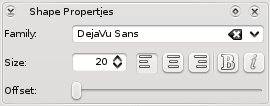Karbon/Tutorials/Artistic Text Shape/fr: Difference between revisions
ChristianW (talk | contribs) (Created page with "Après avoir changé la <menuchoice>police</menuchoice> en "Steve", mis la <menuchoice>taille</menuchoice> à 30 points, et la fonte en <menuchoice>gras</menuchoice>, vous pou...") |
ChristianW (talk | contribs) (Created page with "Après avoir ajouté la forme, vous voudrez peut-être modifier le texte et afficher quelque chose de plus intéressant. Pour ce faire, vous devez activer l'<menuchoice>outil...") |
||
| Line 14: | Line 14: | ||
|} | |} | ||
Après avoir ajouté la forme, vous voudrez peut-être modifier le texte et afficher quelque chose de plus intéressant. Pour ce faire, vous devez activer l'<menuchoice>outil de forme textuelle artistique </menuchoice>, soit en double-cliquant sur la forme nouvellement créée, soit en sélectionnant [[Image:Artistictext-tool.png]] dans la boîte à outils. Ensuite, vous pouvez changer le texte pour quelque chose comme ça. | |||
[[Image:Boring-artistic-text-shape.png|center]] | [[Image:Boring-artistic-text-shape.png|center]] | ||
Revision as of 09:59, 6 March 2018
Ce tutoriel présente ce que l'on peut faire avec les . Bien que ce tutoriel ait été fait avec Karbon, les formes sont disponibles dans les autres applications Calligra, et fonctionnent de la même façon.
Dans cette leçon, vous allez
- créer une forme avec un texte
- associer une forme à un chemin

Premier pas avec une forme textuelle
 |
Pour ajouter une forme textuelle artistique, reportez-vous au docker , cliquez sur l'icône , et déplacez-la sur le canevas. |
Après avoir ajouté la forme, vous voudrez peut-être modifier le texte et afficher quelque chose de plus intéressant. Pour ce faire, vous devez activer l', soit en double-cliquant sur la forme nouvellement créée, soit en sélectionnant  dans la boîte à outils. Ensuite, vous pouvez changer le texte pour quelque chose comme ça.
dans la boîte à outils. Ensuite, vous pouvez changer le texte pour quelque chose comme ça.

Après avoir changé la en "Steve", mis la à 30 points, et la fonte en , vous pouvez observer la forme suivante dans votre canevas :

Suiveur de chemin
This is still a very straight, flat text. Now we want a curvy text. To do this, we will need to create a path, for instance, using the ![]() .
.
Vous devriez avoir quelque chose comme ceci :

Pour associer le texte à la courbe, vous devez activer l' en double-cliquant sur le texte, ou en sélectionnant  .
.
Then, if you move the mouse on top of the curve you will see the cursor changing to a hand, you will need to doubleclick on the curve to attach the path. Using the offset in the docker, you can adjust the text to get the following result:

You can detach the path by clicking on ![]() . You can , and the text. If you change the curve, then the text will be updated.
. You can , and the text. If you change the curve, then the text will be updated.

